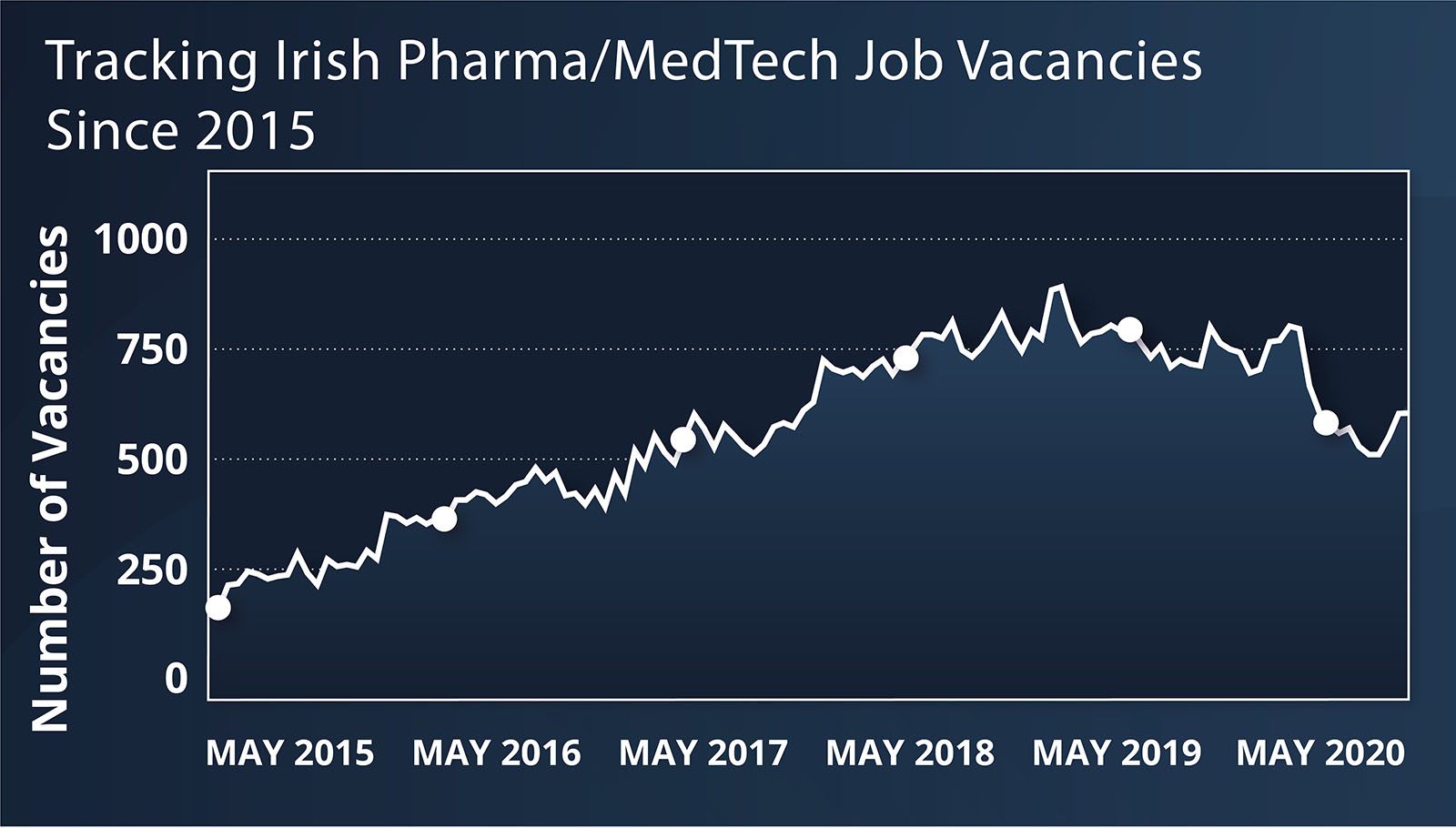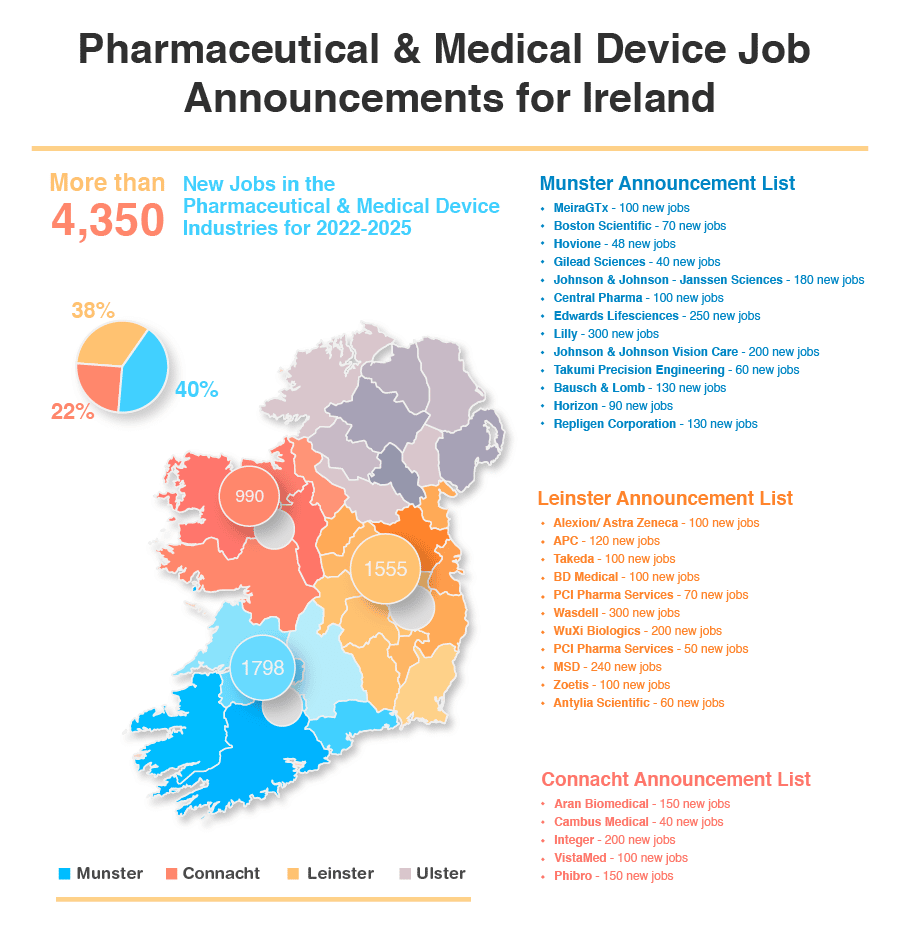Ireland’s BioPharma/MedTech manufacturing industry is extremely strong right now. Arguably, the strongest it has ever been.
All the signs of continued growth are extremely positive, just check out the graph above showing steadily rising job vacancy numbers since 2015.
With the lockdown due to Covid this year, numbers did drop, but they began a bounce back almost immediately.
If you’re already working in the industry, there might never be a better time to:
- Negotiate a higher salary
- Get a promotion
- Persuade your company to pay for training
- Change companies for a better job with a higher salary
Ireland’s Booming BioPharma/MedTech Industry
Not only are there over 69,000 people currently employed directly in BioPharma/MedTech manufacturing in Ireland, it is expected that a further 4,350 new jobs will be created by the end of 2025.
Here’s a quick rundown of where the jobs currently are (on the left), as well as where there are already new job announcements (on the right).

It’s fairly obvious that if you’re not already in the industry, there’s a big opportunity for reskilling and starting a new career. But what about if you’re already there? How can you make this current industry situation work best for you and your career?
The answer really depends on how happy you are in your current job. There are typically 3 categories:
- You’re unhappy with your current company
- You’re not unhappy but could be open to a great offer
- You’re happy with your current company
No matter which group you fall into, there are things you can do to maximise the effect this industry boom can have on your career.
Before we consider each in turn, there are a few key pieces of advice that are relevant no matter which group you fall into…
Know your options
Whether you’re actively looking to move company or not, it’s worth knowing what your local industry options are. You can check out our interactive Factory Locator Map to see the locations of Ireland’s BioPharma/MedTech factories. You can also take a look at this table to see how many employees there are at each site and what products they’re making.
Be clear about your career goals
Where do you want to end up?
What is your dream job within the industry?
Do you know what lies between you and that dream job, and how can you actually get there?
If you’re really not sure, revisit the feedback you were given at your last performance review. What were the things you were praised for? Looking at what your line manager sees as your strengths can be a useful place to start.
Keep up with networking
We’ve written a comprehensive article about the need for industry networking when job hunting but in reality, networking isn’t just a task for job seekers. It’s something you should be doing regularly.
Many opportunities never make it to a jobs board and employers often look for people within their own network. Make sure you’re in a position to hear about opportunities as early as possible. Even if you’re not looking to move, having a clear grasp of the industry through networking leaves you in the best position to maximise the career opportunities that come your way.
With that general advice in mind, let’s now consider how you can use this current booming industry to your advantage.
You’re Unhappy With Your Current Company
Before you make any big company-changing decisions, try to figure out exactly why you’re not happy. This could certainly change the next steps. For example…
- If you’re just not a good fit for this highly-regulated industry or you have an issue that would be common across the majority of companies, a change of company is unlikely to make things any better.
- If it’s just one individual or one small aspect of your role that’s not working for you, you might be able to make some changes without moving company.
- If there are several issues making you unhappy that you think are unique to your current company or you feel like there aren’t the right opportunities for progression for you there, it might be time to consider a move.
Try to step back from feeling unhappy, and objectively figure out if it’s something that can be fixed, or not.
So let’s imagine you’ve decided you want to change companies.
It’s always easier to get a job when you have a job. And as someone with industry experience in a market where there are literally thousands of new jobs coming over the next few years, you should be in a great position.
All our usual job hunting advice applies – check out this pharma job hunting resource centre to see over 40 resources.
A few resources in particular that you should familiarise yourself with:
- Our Factory Locator map – to show you what companies and facilities are within your commutable distance.
- This list of 180 companies – including details of all manufacturing companies but also engineering consultancies and recruitment companies that might be useful in your job hunt.
- Finally, make sure you’re signed up to receive our job updates. GetReskilled runs Ireland’s Largest Pharmaceutical job and MedTech jobs board. It’s updated twice every month and can be sent straight to your inbox to ensure you’re always one of the first to hear about the update.
If that all sounds a little overwhelming, take a look at our Advanced Career Coaching programme. The Advanced Career Coaching programme is a specially designed job hunting programme that guides you through the process. We’ll tell you what to do and when to do it, to make your job hunt as easy, quick and successful as possible.
Perhaps, most importantly, remember to remain professional. Even if you’ve absolutely decided that your future isn’t with this company, you’ll still need a reference and industries can be small – you never know who might be talking to who.
And finally, keep making the most of the situation you’re currently in. You never know what changes might happen and make your current company a whole lot more appealing, so don’t just “check out” once you decide you want to look for something else.
You’re Not Unhappy but Could be Open to a Great Offer
In today’s work environment, this might be the situation that most people feel they relate to. You don’t dislike where you currently work but if something better came along, you’d consider it.
Even a generation ago, people expected jobs for life – to find a company and work their way up as far as they could before retiring.
If you’ve made your start in this industry a little late in your career, you might still have this mindset – and that’s fine. But it’s worth noting that there isn’t the same expectation of employees to work their whole career in one company.
As long as you’re not changing jobs every year or two, your CV won’t be considered unusual with a few changes of company.
If you’re in this category, it’s probably most important that you take some time reasonably regularly to take stock of your situation and see if it’s changed.
Many people just let their current circumstances continue, unchallenged. With the opportunities this current environment can offer, that could be a mistake.
So every 6 months or every year (perhaps as you prepare for performance reviews), sit down and consider if you’re still happy where you are and if there are aspects of your career you’d like to change.
But how do you go about doing this?
- If you’re happy with the level of job and responsibility you currently have, is your salary at a point you’re happy with (and in line with industry norms)?
- If you’re ultimately looking to progress beyond your current level, is that a possibility within your current company?
- And if it is possible, is this something you’re clear on how to achieve?
- Are you being offered the opportunity to take on additional responsibilities and learn new things (if this is what you want)?
- Is your work-life balance at a point you’re happy with? (For example if a different company has opened a new site closer to your home, there might be the opportunity for a shorter commute or a change in shift pattern)
- Are there jobs out there that you’d be qualified to do that are offering better salaries or perks?
When weighing up all these options, try not to get too distracted by one aspect of any other company and consider them as a whole package. The grass isn’t always greener and you need to fully consider the risks associated with the unknowns of a new company.
It’s worth noting that people will often put themselves in this group because it seems like the easiest option. But if you’re truly in this group, you’ve almost got double the work to do. Thinking you can just sit back and a job will magically land on your doorstep is unlikely to be a recipe for career success.
All too often people think they’re in this category and time simply passes them by.
Actually, it’s probably best to follow the advice for the group above and the group below. You’re well placed to take advantage of the opportunities available to both groups in this current industry boom.
You can prepare yourself with all the necessary information about your local options and make sure you’re receiving current job opening to your inbox (as described above) without the active job hunt. You can also make sure you’re getting the most out of your current situation by discussing progression or alternative opportunities with your current company (as described below).
Either way, make sure you keep up with industry networking. If you’re “passively job hunting” (i.e. you’re open to a new opportunity but you’re not necessarily spending hours each week looking for it), networking is where you’re likely to find the best returns.
Much like our pharmaceutical jobs board being delivered to your inbox, networking will allow you to hear about opportunities as soon as they’re available and give you a chance to consider if it’s the great thing you’ve been waiting for.
Networking also allows you to get to know the opportunities that other companies offer their staff and know what you might realistically expect from a role there.
The other main reason people put themselves in this group is because it’s often easier just to stay where you are. Change takes effort. And people often don’t know where to start.
If that’s the reason you’ve put yourself into this group – you’re definitely not making the most of the opportunities of this current market. Consider our Advanced Career Coaching programme.
It takes the uncertainty out of the process by laying out the steps you need to take, one at a time. We’ll help you decide which roles are right for you and show you how to successfully job hunt around your current role.
You’re Happy With Your Current Company
Just because you’re happy with your current company, doesn’t mean you have to settle. The worst thing for your career can be doing nothing.
Even with no desire to move, there are definitely still ways you can (and should) make this current industry climate work for you.
In an environment like this, with more companies and more sites in any given area, companies will always be keen to secure and keep the best staff. Staff retention is key for companies right now.
If you followed our general advice above, you’ll have a good idea of where you’re trying to aim for in your career. We also mentioned performance reviews in our first section. If you have one coming up, it’s a great opportunity and one you should prepare for.
You should see a performance review as a two-way conversation. Yes, it’s a chance for your manager to discuss your performance in your current role but it’s also about discussing career development.
For most people, if they’re happy with their current company, they’re looking to move upwards but this might mean different things to different people. To some it’s staying in their current job but gaining some new responsibilities, for others it’s moving into a senior role in that current department. For some people it might moving into a more specialist department.
Any good performance review will talk about career development. But in an environment like this, you don’t have to wait for performance reviews – you can take all the same steps in preparation and then pitch your suggestions to your manager.
Essentially, figure out what you’re trying to achieve and then do some research about how you can get there. For most, that will mean taking some kind of training.
What people often don’t realise is that companies have training budgets. Money specifically set aside for staff development.
First, check out your company handbook for training policies. They might offer in-house courses but many also have a budget to fund external courses.
Next, research specific options. Depending on what you’re trying to achieve, there may be a range of courses available to you. Find a course you’re interested in and work from there.
The strongest case will show a few options and why you discounted them (e.g. they’re not as convenient) – this makes your chosen course seem even more appealing.
If you don’t know where to start in researching courses, start by looking at the types of pharmaceutical courses that GetReskilled offers (or you can contact us to discuss some options). Even if you don’t think any of our courses are right for you, you’re much more likely to know what to look for as a result.
Things to remember when asking for funding for training
- It’s easy to think about all the benefits for you but when you’re discussing it with a manager, what are the benefits for them? How does this help them achieve their goals? And what are the benefits to the wider company? Create a clear list of the benefits and be as specific as you can when highlighting them.
- Some companies can be unsure about upskilling staff if they think they’ll leave – make it clear that you’re looking to stay long term.
- Show how you can make this work alongside your current commitments. As an example, online courses are a great option as they require no time off-site – you can work around your current shift pattern or working hours. This would probably be an easier sell to a manager than a course that requires you to commit to classes or restrict your working hours/availability. Whatever course you’ve chosen, think about how you can demonstrate how you’ll make it work.
If you’re considering any of GetReskilled’s industry upskilling courses, we can work with you directly to help you figure out how to discuss it with your manager.
If you get hesitation or a negative result when talking to your manager, try to find out the reasons why.
Perhaps there was something you didn’t explain well enough or an objection you didn’t know they had that can be easily countered. Or perhaps there’s just no budget left this financial year and you can be first in line next year.
If you find that your company actually doesn’t support development in this way, that’s always something to consider when weighing up future career options or other opportunities that come your way.
In Summary…
The opportunities available as a result of the current booming BioPharma/MedTech market in Ireland aren’t limited to those looking to start a new career here. If you’re already in the industry there are ways to use this situation to your advantage.
- If you’re unhappy with your current company – actively job hunt, we have lots of free and accessible resources to help you as well as our guided Advanced Career Coaching programme.
- If you’re not unhappy but could be open to a great offer – you need to put yourself in a position to hear about new jobs and also maximise the opportunities at your current role. You should be considering the advice given to both other groups.
- If you’re happy with your current company – that doesn’t mean you should just sit still, there are still very clear ways to maximise the opportunities of this market. Figure out what you want, make it clear and work with your employer to figure out a plan to achieve it.
About the Author
Claire Wilson
Content Marketing and Career Coaching
Claire runs GetReskilled’s Advanced Career Coaching Programme – our specially devised job hunting course that helps our trainees take that final step into employment by leading them through the job hunting process. She is extremely enthusiastic about helping people reach their final goal of employment in their new career path.
Claire has a BSc (Hons) in Medical Biology from Edinburgh University and spent 7 years working in the pharmaceutical and medical device industries.



Post Your Comments Below